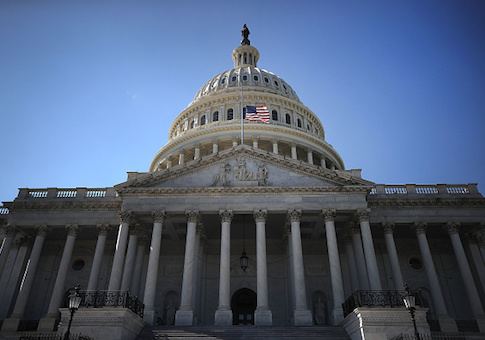The Senate Foreign Relations Committee Thursday advanced a bipartisan resolution calling on the Iranian government to release unjustly detained U.S. citizens and permanent residents held there and urging the Trump administration to continue to make the issue the "highest of priorities."
The Senate action comes amid heightened tensions between the two countries with reports that President Trump's national security team has unanimously recommended that he decertify the Iran nuclear deal in an attempt to fix it.
To carry out the fixes, Congress would work with the Trump team to apply new pressure on the Iranian regime to rework controversial parts of the nuclear agreement.
Critics of the original nuclear deal and advocates for the American hostages hope that new Trump administration pressure on Iran will include demanding the release of these hostages.
The House passed a similar resolution in early May, and the full Senate is expected to take up the measure in the coming weeks.
"The Iranian regime has unjustly detained, interrogated Americans and dual-nationals for the receipt of economic or political concessions," Sen. Ted Cruz (R., Texas) said in a statement. "The release of these prisoners—both U.S. citizens and permanent residents aliens—must be our utmost priority."
"If Iran wants to be accepted by the community of nations and be observed in the international order, as it suggests it aspires to do so, it has to stop hostage taking. And stop in a particular way that targets the United States and legal permanent residents and uses them, at the end of the day, as pawns," said Sen. Bob Menendez (D., N.J.), former ranking member of the Senate Foreign Relations Committee and vocal critic of the Iran nuclear deal.
In a bizarre twist, a member of Iran's team of nuclear-deal negotiators responsible for helping to forge the 2015 agreement with the United States and five other world powers on Wednesday was reportedly sentenced to five years in prison on espionage charges.
The negotiator was not named in the report but the only known person involved in striking the deal is Abdolrasoul Dorri Esfahani, a dual Iranian-Canadian national and accountant involved in banking-related aspects of the nuclear negotiations, according to Agence France-Presse.
The resolution, sponsored by Sens. Cruz, Patrick Leahy (D., Vt.), and Cory Booker (D., N.J.), calls on the government to release all U.S. citizens and legal permanent residents, as well as foreign nationals unjustly held there. The resolution also urges the United States and its allies who also have citizens detained in Iran to create a multi-national task force to secure their release.
Critics of the Iran nuclear deal have accused the Obama administration of giving Iran a greater incentive to take more U.S. hostages with its $1.7 billion payment to Tehran last year, $400 million of which was paid in cash and timed to the ensure the release of four U.S. hostages.
Since the U.S. payments were made early last year, Iran's Revolutionary Guard Corps has taken hostage Siamak and Baquer Namazi, Karan Vafadari and Xiyue Wang, as well as permanent legal residents Nizar Zakka and Afarin Niasari.
Attorneys for Baquer Namazi and Zakka have recently said that both men's health is rapidly declining. Namazi recently had to undergo surgery in Iran to install a pacemaker. Zakka is suffering from untreated dental problems and internal stomach bleeding and is now on a hunger strike to protest the false charges and cruel treatment.
The Iranians have sentenced them on false espionage and other charges, according to their lawyers and families.
Iran also has imprisoned several dual-nationals of other western nations in recent months, including citizens of the United Kingdom, France, Germany, and Canada.
The resolution also calls for the safe return of Robert Levinson, a former Federal Bureau of Investigation agent who went missing in Iran in 2007. After the prisoner exchange early last year, then-Secretary of State John Kerry said the Iranian government had pledged to help in the search for Levinson.
The Trump administration leveled new economic sanctions against senior Iranian officials and its prison systems in April for what White House officials said were widespread human rights abuses, including systematic torture of those being held.
The sanctions target Tehran Prisons Organization and Sohrab Suleimani, a senior official in the prison system.
Sohrab Suleimani is responsible for running Iran's Evin Prison, which is known for its harsh conditions and forced interrogations. Many, if not all, of the prisoners with U.S. citizenship or green cards are being held there.
Update 12:08 p.m.: This post has been updated with comment from Sen. Cruz.
